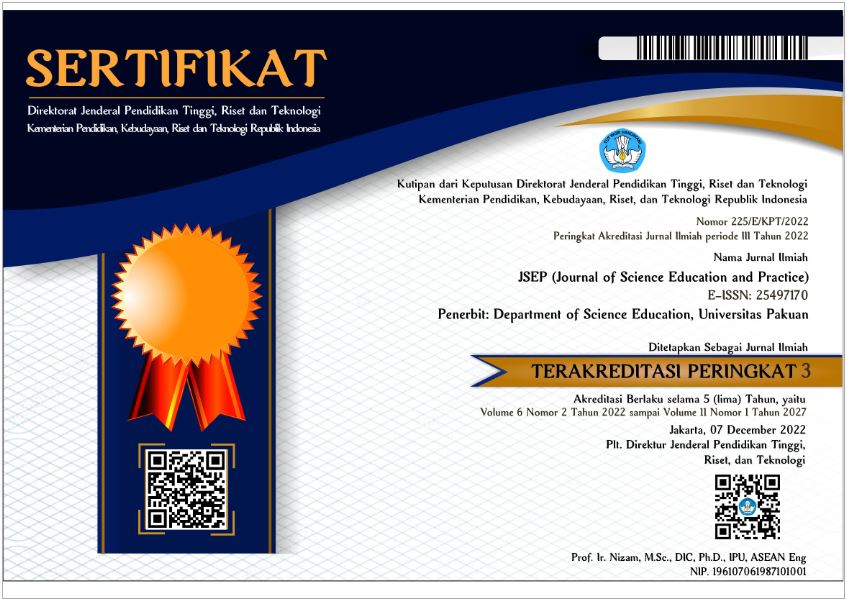ADDITIONAL MENU
The Application Of Guided Inquiry Learning In Improving The Mastery Of Concepts And Science Process Skills On Vibration And Wave Material
Abstract
Keywords
References
Abungu. H.E. Mark I.O.O, and Samuel W.W. (2014). The Effect of Science Process Skills Teaching on Scondary School Student Achievement in chemistry in Nyando District, Kenya. Journal of education and social research. MCSER. Publishing. Rome-Italy. Vol. 4. No. 6.
Anderson, Lorin W. (2001). Pembelajaran, Pengajaran, dan Asssmen revisi Taksonomi Pendidikan Bloom. Jakarta: Pustaka Pelajar.
Arikunto, S. (2010). Dasar-dasar Evaluasi Pendidikan . Jakarta: PT. Bumi Aksara.
Dahar, R. W. (2006). Teori-teori Belajar. Jakarta : Erlangga.
Ergul, R. Yeter U, Sevgull C. Zehra O, Uirin G, and Meral U. The Effect of Inquiry-Based Science Teaching On Elemtary School Student Science Process Skill and Science Attitudes. (2011). Bulgarian Journal of science and education policy (BJSEP). Vol. 5. No. 1.
Fraenkel, J.R. et al., (2012). How to design and Evaluate Reseach In Education, 8th Edition. New York:Mc. Graw-Hill.
Giancoli, D.C. (2001). Fisika Edisi Kelima Jilid 1 (Satu). Jakarta. Erlangga.
Hamalik, O. (2013). Proses Belajar mengajar. Jakarta. Bumi Aksara..
Hosnan, M. (2004). Pendekatan Saintifik dan Konseptual Dalam Pembelajaran abad 21. Bogor. Ghalia. Indonesia Methods on Senior Secondary School Student Performance In Biology In Imo State.
Ibe and Helen, N.N. Effects of Guided-Inquiry and Expository Teaching. (2013). Journal of education research and behavioral science. Vol. 2(4), pp. 051-057.
Muslich, M. (2009). KTSP Pembelajaran Berbasis Kompetensi dan Kontekstual. Jakarta: Bumi Aksara.
Nurlaela, L. dan Euis I. (2015). Strategi Belajar Berpikir Kreatif.. Yogyakarta: Ombak.
Nworgu, L.N & Otum. V. (2013). Effect Of Guided Inquiry With Analogi Intructional Strategi On Student Acquition Of Science Process Skill. Journal of education and practice, 4(27), hlm.35-40.
Rustaman, N.Y. (2005). Strategi Belajar Mengajar Biologi. Malang: UM. Press.
Sanjaya, Wina. (2010). Strategi Pembelajaran. Jakarta: Kencana.
Sudjana, N. (2008). Dasar-dasar roses Belajar Mengajar. Bandung: Algesindo.Sinar Baru Algesindo.
Sugiyono. (2013). Metode Penelitian Kombinasi (Mixed Methods). Bandung: Alfabeta.
Trianto. (2014). Model Pembelajaran Terpadu. Jakarta: Bumi Aksara.
Ugwuadu. O.R. (2010). The Effect of Guided Inquiry and Lecture Methods on Student Academic in Biology: A Case Study of Yola North Local Government Area of Adamawa State. Knowledge review. Vol.21. No. 1.
Peggy Brichman, Cara Gormally, Noris Amstrong, and Brittan Hallar,. (2009). Effect Inquiry-Based Learning on Student Science Literacy Skills and Confidence. (2009). International Journal for the scholarship of teaching and learning, Vol.13 No.2.
Wenning, Carl.J.(2005). Levels Of Inquiry: Hierarchies of Pedadogical Practices and Inquiry Proces. Journal physics teacher education.2(3). Hal. 3-12.
Wisudawati, A.W. dan Eka Sulistyowati. (2014). Metodelogi Pembelajaran IPA. Jakarta: Bumi Aksara.
DOI: 10.33751/jsep.v5i1.5688
 Abstract views : 357
Abstract views : 357
Refbacks
- There are currently no refbacks.
Copyright (c) 2022 JSEP (Journal of Science Education and Practice)

This work is licensed under a Creative Commons Attribution 4.0 International License.












